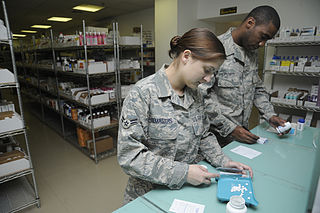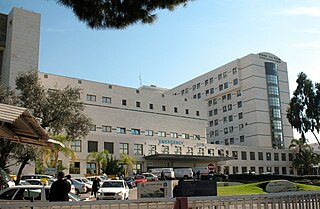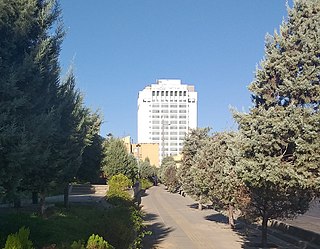
Optometry is a specialized health care profession that involves examining the eyes and related structures for defects or abnormalities. Optometrists are health care professionals who typically provide comprehensive primary eye care.
Medical tourism refers to the practice of traveling to another country to receive medical treatment or healthcare services. This phenomenon has gained popularity in recent years as advancements in technology, transportation, and communication have made it easier for individuals to seek medical care abroad. There are various reasons why people choose medical tourism, including cost savings, access to high-quality medical services, shorter waiting times, and the availability of specific treatments or procedures.

A pharmacy technician performs pharmacy-related functions. Training, certification, licensing, and actual practice of pharmacy technicians varies not only worldwide but in some countries regionally as well as by employer.
Continuing medical education (CME) is continuing education (CE) that helps those in the medical field maintain competence and learn about new and developing areas of their field. These activities may take place as live events, written publications, online programs, audio, video, or other electronic media. Content for these programs is developed, reviewed, and delivered by faculty who are experts in their individual clinical areas. Similar to the process used in academic journals, any potentially conflicting financial relationships for faculty members must be both disclosed and resolved in a meaningful way. However, critics complain that drug and device manufacturers often use their financial sponsorship to bias CMEs towards marketing their own products.
A medical specialty is a branch of medical practice that is focused on a defined group of patients, diseases, skills, or philosophy. Examples include those branches of medicine that deal exclusively with children (paediatrics), cancer (oncology), laboratory medicine (pathology), or primary care. After completing medical school or other basic training, physicians or surgeons and other clinicians usually further their medical education in a specific specialty of medicine by completing a multiple-year residency to become a specialist.

The General Medical Council (GMC) is a public body that maintains the official register of medical practitioners within the United Kingdom. Its chief responsibility is to "protect, promote and maintain the health and safety of the public" by controlling entry to the register, and suspending or removing members when necessary. It also sets the standards for medical schools in the UK. Membership of the register confers substantial privileges under Part VI of the Medical Act 1983. It is a criminal offence to make a false claim of membership. The GMC is supported by fees paid by its members, and it became a registered charity in 2001.

For health issues in Iran see Health in Iran.

The healthcare delivery system of Pakistan is complex because it includes healthcare subsystems by federal governments and provincial governments competing with formal and informal private sector healthcare systems. Healthcare is delivered mainly through vertically managed disease-specific mechanisms. The different institutions that are responsible for this include: provincial and district health departments, parastatal organizations, social security institutions, non-governmental organizations (NGOs) and private sector. The country's health sector is also marked by urban-rural disparities in healthcare delivery and an imbalance in the health workforce, with insufficient health managers, nurses, paramedics and skilled birth attendants in the peripheral areas. Pakistan's gross national income per capita in 2021 was $4,990 and the total expenditure on health per capita in 2021 was Rs 657.2 Billion, constituting 1.4% of the country's GDP. The health care delivery system in Pakistan consists of public and private sectors. Under the constitution, health is primarily responsibility of the provincial government, except in the federally administered areas. Health care delivery has traditionally been jointly administered by the federal and provincial governments with districts mainly responsible for implementation. Service delivery is being organized through preventive, promotive, curative and rehabilitative services. The curative and rehabilitative services are being provided mainly at the secondary and tertiary care facilities. Preventive and promotive services, on the other hand, are mainly provided through various national programs; and community health workers’ interfacing with the communities through primary healthcare facilities and outreach activities. The state provides healthcare through a three-tiered healthcare delivery system and a range of public health interventions. Some government/ semi government organizations like the armed forces, Sui Gas, WAPDA, Railways, Fauji Foundation, Employees Social Security Institution and NUST provide health service to their employees and their dependants through their own system, however, these collectively cover about 10% of the population. The private health sector constitutes a diverse group of doctors, nurses, pharmacists, traditional healers, drug vendors, as well as laboratory technicians, shopkeepers and unqualified practitioners.
Medical Council is the name of the regulatory body that grants medical licenses in many countries. Specifically, it may refer to:

The Ministry of Health is the ministry of the Government of Turkey responsible for proposing and executing the government policy on health, planning and providing healthcare and protecting consumers. Likewise, it is responsible for proposing and executing the government policy on social cohesion and inclusion, family, protection of minors, youth and of care for dependent or disabled persons. The Ministry is headquartered in the Bakanlıklar in Ankara.

Healthcare in Malaysia is mainly under the Ministry of Health. Malaysia generally has an efficient and widespread system of health care, operating a two-tier health care system consisting of both a government base universal healthcare system and a co-existing private healthcare system. While there is a universal healthcare system, specialist services require queuing despite being free. Hence the private health care plays a major role in providing specialist services which complements the universal health care.

Healthcare in Israel is universal and participation in a medical insurance plan is compulsory. All Israeli residents are entitled to basic health care as a fundamental right. The Israeli healthcare system is based on the National Health Insurance Law of 1995, which mandates all citizens resident in the country to join one of four official health insurance organizations, known as Kupat Holim which are run as not-for-profit organizations and are prohibited by law from denying any Israeli resident membership. Israelis can increase their medical coverage and improve their options by purchasing private health insurance. In a survey of 48 countries in 2013, Israel's health system was ranked fourth in the world in terms of efficiency, and in 2014 it ranked seventh out of 51. In 2020, Israel's health system was ranked third most efficient in the world. In 2015, Israel was ranked sixth-healthiest country in the world by Bloomberg rankings and ranked eighth in terms of life expectancy.

Healthcare in Thailand is overseen by the Ministry of Public Health (MOPH), along with several other non-ministerial government agencies. Thailand's network of public hospitals provide universal healthcare to all Thai nationals through three government schemes. Private hospitals help complement the system, especially in Bangkok and large urban areas, and Thailand is among the world's leading medical tourism destinations. However, access to medical care in rural areas still lags far behind that in the cities.
A clinical officer (CO) is a gazetted officer who is qualified and licensed to practice medicine.

The Ministry of National Health Services, Regulation and Coordination is a cabinet level ministry of the government of Pakistan with responsibility for national public health.

The Ministry of Health and Medical Education (MOHME) has executive responsibility for health and medical education within the Iranian government. The MOHME comprises five departments headed by deputy ministers:
- Research and Technology
- Education
- Logistics
- Food and Drugs
- Health

Health professional requisites refer to the regulations used by countries to control the quality of health workers practicing in their jurisdictions and to control the size of the health labour market. They include licensure, certification and proof of minimum training for regulated health professions.

Dubai Healthcare City (DHCC) is a healthcare free economic zone situated in the Emirate of Dubai, United Arab Emirates. DHCC was launched in 2002 by Mohammed bin Rashid Al Maktoum, vice-president and Prime Minister of the UAE and Ruler of Dubai. DHCC was mandated by the government to meet the demand for high-quality, patient-centered healthcare, and the main aim is to attract tourists to Dubai for medical services and treatments.

National Medical Commission (NMC) is an Indian regulatory body of 33 members which regulates medical education and medical professionals. It replaced the Medical Council of India on 25 September 2020. The Commission grants recognition of medical qualifications, gives accreditation to medical schools, grants registration to medical practitioners, and monitors medical practice and assesses the medical infrastructure in India.

The Association of Licentiates of Medical Council of Hong Kong (ALMCHK) is an independent, non-profit, professional medical organisation established in 1995 representing the licentiate doctors in Hong Kong. It is the first of its kind designated for all non-local graduated licentiate doctors in Hong Kong. Membership are designated to registered doctors in Hong Kong who obtained LMCHK. The primary objective is to safeguard the welfare and rights of licentiates doctors. It is also one the few CME programme providers accredited by the Medical Council of Hong Kong (MCHK).














